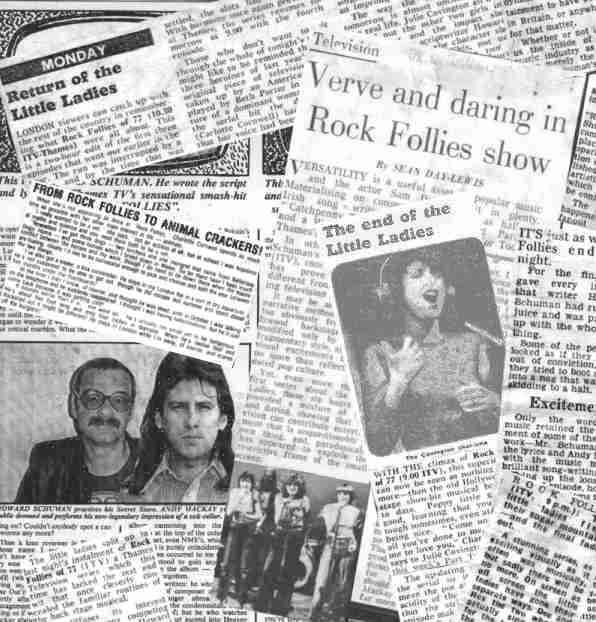
Where possible I have quoted the source of the clipping.
Unfortunately I didn't keep a note of most of them!!
All clips, unless otherwise stated, are from UK sources and are from the 1976/77 period.
THE SCRAPBOOK
Do you have anything I could add to the scrapbook?
I don't have any reviews of the first series and I'd particularly
like to add some American reviews - can you help?

Where possible I have quoted the source of the clipping.
Unfortunately I didn't keep a note of most of them!!
All clips, unless otherwise stated, are from UK sources and are from the 1976/77 period.

|
|
RETURN OF THE LITTLE LADIES - LONDON viewers can catch up with the rest of the country in remembering what Rock Follies of '77 (10.30 ITV-Thames) were all about. This is a two hour edit of the first three episodes that went out earlier in the year. The run was interrupted by a strike, and by the time that was settled, the slots had been filled. With harmony once again prevailing at Thames, the series resumes tomorrow at 9.00 with the forth episode. |
Those who don't want to sit through the whole of tonight's recap might like to be reminded that the three heroines of last year's most original piece of television were taken up by an American agent, played by Beth Porter in a caricature of a dominant woman, and as the serial bit the dust, Anna (Charlotte Cornwell) had discovered that her voice had been re-recorded behind her back by Dee (The dynamic Julie Covington). Dee had also been briefly joined by a Welsh singer, Rox (Sue |
Source unknown |

| Television Daily Telegraph Verve
and daring in Rock Follies Show VERSATILITY is a useful asset in popular music and the actor Sam Dale has it in plenty. Materialising on consecutive evenings as half an Irish song-writing team in Stewart Parker's "Catchpenny Twist," the BBC-1 "Play for Today," and a |
|
| Welsh groupie with Thames's Little Ladies. In other ways Howard Schuman's Rock Follies (ITV), concluded last night, has proved refreshingly different from the surrounding television landscape. It may be argued that the narrative method was derived too obviously from the Hollywood backstage romance, modified only by Schuman's fragmentary style, and that the visual excitements have done no more than reflect an out-dated pop culture. Yet, even more than the first series about the Little Ladies, these six hours have provided a mixture of verve and daring, showing that television can contribute entertainment that is unquestioningly its own thing,and, paradoxically has appeared to explode the restrictive frame of the small screen. The high point, I think, was episode four. Since then the disintegration of the group has led to some flagging of energy and invention: Dee (Julie Covington), and Rox (Sue Jones-Davies), could provide musical sustenance but Q (Rula Lenska), and Anna (Charlotte Cornwell), were dramatically essential. The final episode, "The Real Life." gave a verbal introduction to Ruby Slippers, a Californian manifestation of "gay rock with bi-sexual appeal," discovered in a sauna bath, but they were kept out of sight just as the music and production largely repeated what had been seen and heard before. Even the splendidly outrageous Kitty Schreiber (Beth Porter) - "I may be a rat, but I am a rat who says 'Yes' to life" - looked to be comparatively less "KrayZee" than usual. It is right that the Little Ladies, really not a good rock group by any standards, should now disappear. It would nevertheless be a pity if Thames lost all sight of the production team. Bill Hayes,the director, has a notable talent which should be cultivated and Andy Mackay's music has become far more fitting with practice. Daily Telegraph |
|
|
Source unknown |
Click icon below for next page